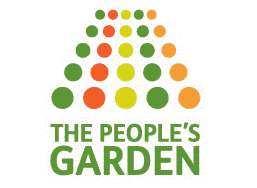People's Garden Grant Program
The People's Garden Initiative has demonstrated that one direct and effective way of improving food access is to plant a garden - not so the communities will become self-sufficient - but because being involved in agriculture has benefits far beyond the end product of the produce.
The People's Garden Grant Program was designed to invest in urban and rural areas identified as food deserts and/or food insecure areas, particularly those with persistent poverty. The major goal of the People's Garden Grant Program is to facilitate the initial investment needed in these communities, not long-term support.
The USDA People's Garden Grant Program is managed by the USDA National Institute of Food and Agriculture. Funding was provided by several USDA agencies which include: the Agriculture Marketing Service, Animal and Plant Health Inspection Service, Food and Nutrition Service, Forest Service and the Natural Resources Conservation Service.
People's Garden grants were awarded to the following recipients in September 2011.
2011 People's Garden Grant Award Recipients
(alphabetical order by state)
ALASKA
Recipient: Homer Soil and Water Conservation District
Homer, Alaska
Proposal title: Growing Healthy: Growing and Learning from People's Gardens on the Southern Kenai Peninsula, Alaska
Award total: $110,500
Website: http://www.homerswcd.org/
Description:
The mission of Homer Soil and Water Conservation District is to provide education and leadership in the conservation and sustainable use of soil and water-related resources through cooperative programs that protect, restore and improve our environment. They plan to create or refurbish at least 18 People's Gardens throughout the Southern Kenai Peninsula. A variety of community groups, ranging from schools to Native communities to mental and physical health organizations to public interest entities, will develop their own gardens. One of the many benefits of these gardens will be to increase awareness and exploration of solutions to the issue of local food insecurity. Significant food security issues exist in targeted communities because of how far the southern Kenai Peninsula is from reliable, year-round food supplies. In addition, deliveries of food supplies are vulnerable to disruptions in transportation systems. Of equal importance, this project will help address community needs for better nutrition and will provide significant educational opportunities about growing food, what constitutes good nutrition and how to follow healthy lifestyles.
ARIZONA
Recipient: University of Arizona
San Carlos, Arizona
Project title: San Carlos Apache Reservation Youth, School, and Family Gardens
Award total: $5,000
Website: http://extension.arizona.edu/
Description:
As the state's land grant university, the University of Arizona (UA) honors their three-fold commitment to education, research and community service. UA faculty and students share their knowledge, their time and their resources throughout the state and around the world. UA extension agents provide programs in agriculture/natural resources and 4-H youth development as well as support for selected programs in community development and family and consumer sciences to the San Carlos Apache Reservation. Many Apaches have lost the culture of growing and harvesting traditional crops; therefore, their diet has changed dramatically in the past 100 years, with adverse health consequences. These problems include diabetes, obesity and heart disease. San Carlos Apache community members will build 5 gardens around their community, for the residents of San Carlos and Bylas, to learn about nutrition and how to choose healthier foods for consumption. UA plans to do community outreach to elders and youth, who are the most vulnerable to the effects of malnutrition. Extension agents will continue to provide appropriate extension educational programs to help improve quality of life within the San Carlos Apache Indian reservation.
CALIFORNIA
Recipient: Los Angeles Neighborhood Land Trust
Los Angeles, California
Project title: The Los Angeles Neighborhood Land Trusts "Building Up LA's Gardens" Program
Award total: $29,000
Website: http://lanlt.org/
Description:
The mission of the Los Angeles Neighborhood Land Trust (LANLT) is to grow healthier, safer and stronger communities by creating small, accessible urban parks and gardens which address the lack of green and recreational spaces in greater Los Angeles' underserved neighborhoods. The LANLT mission also ensures participation and collaboration among low-income residents throughout the process of envisioning, building and managing the parks and gardens they create. In August 2011, LANLT completed an inventory of the community gardens within the Los Angeles region. During the process of creating the inventory it became clear that many gardens were in dire need of capacity building assistance, and also that most gardens did not possess or utilized an educational curriculum.
The "Building Up LA's Gardens" program is intended to revitalize and repurpose two moribund community gardens, create one new school garden and create one new community garden within an existing park. As part of the "Building Up LA's Gardens" program the LANLT will do the following: perform capacity assessments in questionnaire form for each of the proposed four garden projects and present the assessment findings; make recommendations to the administrators and members of the gardens; and arrange topic-specific trainings led by community garden experts to increase the garden's self-sufficiency. Each garden will work with the Children's Nature Institute, a project partner, to create a garden-specific educational curriculum. As the organizational capacity and self-sufficiency of each garden increases, so will the benefits that each garden provides.
COLORADO
Recipient: Denver Urban Gardens
Denver, Colorado
Proposal title: Community Engagement, Empowerment, and Elevation through Community Gardening in Metro Denver
Award total: $70,000
Website: http://dug.org/
Description:
The Denver Urban Gardens (DUG) mission is to come alongside residents, and together, they grow community - one urban garden at a time. They will work with communities in five metro Denver counties to establish 14 new, sustainable, produce-focused community gardens. These gardens will be located in high-need areas, suffering from hunger and food insecurity and provide an extraordinary place for learning and healthy living.
DUG will be partnering with Colorado State University Extension to offer families and youth hands-on lessons in biology and ecology, horticulture, wellness and nutrition, composting and community building.
CONNECTICUT
Recipient: Knox Parks
Hartford, Connecticut
Project title: Gardens to Groves: Tipping the Scale on Food Security in Hartford
Award total: $50,000
Website: http://knoxparks.org/
Description:
Using horticulture as a catalyst, Knox Parks works in partnership with residents, businesses and government to build stronger, greener and more beautiful communities in Greater Hartford, with a special emphasis on the Capital City itself. With this grant, Knox Parks will reduce hunger with food gardens and fruit tree plantings and restore Hartford's tree canopy through subgrants to communities in disadvantaged, urban areas of Hartford. They plan to energize and educate the Greater Hartford Community about the social, economic, health and wellness and environmental benefits of growing your own food and restoring the tree canopy.
Knox Parks will work with the following: Connecticut Northeast Organic Farming Association and the Connecticut Community Gardening Association to educate members of the community; the University of Connecticut to conduct research on the benefits of community gardening; and the City of Hartford to secure and protect community gardening properties.
HAWAII
Recipient: Heritage Ranch, Inc.
Honaunau, Hawaii
Proposal title: Same Canoe Community Gardens Project
Award total: $110,500
Website: http://heritageranchinc.org/index.html
Description:
Heritage Ranch is a non-profit agency serving the Pacific, Northwest and Southwest with projects serving Hawaii, Washington, California, Arizona and New Mexico. They are focused on introducing new sustainability tools and technologies to improve the quality of life in underserved communities. They plan to work with the One Island Sustainable Living Center to foster a network of 12 organizations to grow a total of 144 community and neighborhood People's Garden plots, which include 24 non-profit community People's Garden projects and 120 neighborhood mini-garden demonstration projects in West Hawaii. The goal of this project is to empower low income, high poverty and at-risk populations to gain access to healthier foods by growing it themselves. In addition to food gardens, this community collaborative also will work on wildlife habitat gardens and reforestation projects.
MARYLAND
#1 Recipient: Towson University
Towson, Maryland
Project title: Cherry Hill People's Garden
Award total: $60,000
Website: http://cherryhillpeoplesgarden.wordpress.com/
Description:
With more than 21,000 students, Towson University is the second-largest public university in Maryland. It is located in suburban Towson, eight miles north of Baltimore. Towson University faculty members will serve as consultants to micro-subgrant recipients, serve on the Cherry Hill People's Garden Advisory Committee and supervise college students who will educate residents on horticulture, environmental science, ergonomic practices, economic development and marketing. Micro-subgrants will go to groups or institutions in order to establish school and community gardens for the Cherry Hill community. Cherry Hill is an approximately one square mile, geographically isolated, food desert neighborhood in Baltimore, Maryland. Residents are impoverished and experience some of the highest rates of chronic disease in the city. Cherry Hill residents will learn about horticulture, environmental science, sustainable gardening practices, nutrition and the preparation of healthy meals using produce grown in the community. Master Gardeners and Parks & People Foundation volunteers will serve as consultants on the project.
#2 Recipient: Alliance for Community Trees
College Park, Maryland
Project title: People's Garden Grant Program - ACTREES Funding Proposal for Micro Sub-Grants & National Program
Award total: $150,000
Website: http://actrees.org/site/index.php
Description:
The mission of Alliance for Community Trees, Inc. (ACTrees) is to support grassroots, citizen-based nonprofit organizations dedicated to urban and community tree planting, care, conservation and education. ACTrees will motivate local tree-plantings that support sustainable urban agriculture initiatives and provide micro-subgrants to its network of member organizations. These funds will be distributed across a diverse mix of member organizations for tree-planting projects that will directly impact the lives of families and establish and expand People's Gardens across the country. Projects will include the planting of shade trees to provide weather or line-of-sight screens for local community gardens and the planting of fruit and nut trees for local consumption and production.
MICHIGAN
Recipient: Calhoun Conservation District
Marshall, Michigan
Proposal title: People's Community Gardens of Southwest Michigan
Award total: $70,000
Website: http://calhouncd.org/
Description:
The mission of the Calhoun Conservation District is to serve, educate, and empower their community by providing technical assistance and information to landowners in all aspects of natural resource management. Within the thirteen counties of southwest Michigan, they plan to establish up to 25 community gardens in poverty and low income areas creating locally sponsored and self-sufficient gardens that will supply fresh produce to improve upon residents access to healthy food. Wildlife gardens can be created in urban areas lacking green space or in public areas, such as schools, for educational purposes. Service organizations and other established community garden groups and community volunteers, will work collaboratively with the Calhoun Conservation District to coordinate outreach efforts assisting in the launch of new gardens using these grant funds.
OHIO
Recipient: Youngstown Neighborhood Development Corporation
Youngstown, Ohio
Project title: Mahoning Valley Garden Microgrant Program
Award total: $70,000
Website: http://www.yndc.org/
Description:
The mission of the Youngstown Neighborhood Development Corporation (YNDC) is to improve the quality of life in Youngstown by building and encouraging investment in neighborhoods of choice for all. The Mahoning River Corridor Garden Grant program will provide microgrants for the establishment of new gardens which will serve as community educational resources to residents of municipalities in the Mahoning River Corridor region of northeast Ohio, including Lowellville, Struthers, Campbell, Youngstown, Girard, McDonald, Niles, Warren and Newton Falls. These historically industrial communities have experienced extreme employment and population loss resulting in abundant vacant lands in urban neighborhoods. These projects will address the challenges of vacant land and community disinvestment in urban neighborhoods, provide healthy food access in food desert communities and create healthier community gathering spaces, encouraging greener and healthier communities. The program will include a comprehensive environmental education program, focused on topics relevant to the urban environment. Specifically, the topics will include:
- dealing safely with urban soil contamination;
- the establishment and use of urban forests;
- composting;
- the role of native plants in urban ecosystems;
- using produce to create nutritious meals; and
- stormwater management through green infrastructure.
By encouraging interested residents to work with neighborhood associations and established community organizations, YNDC hopes to encourage projects that are sustainable in the long term and fully rooted in the neighborhoods.




